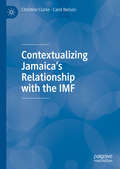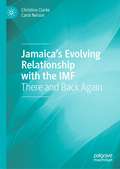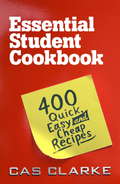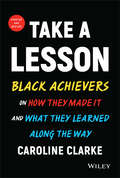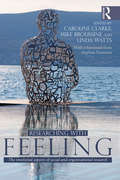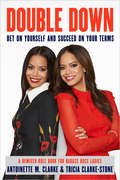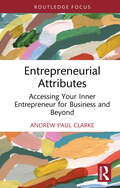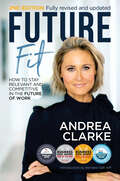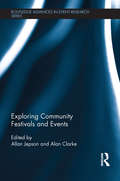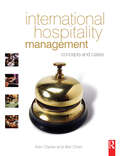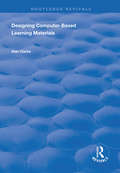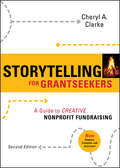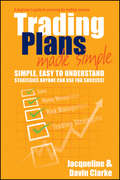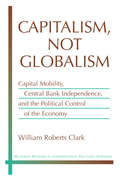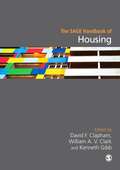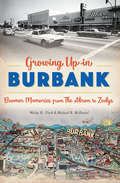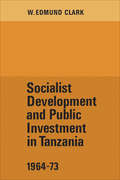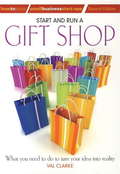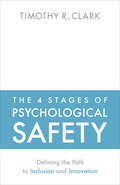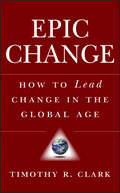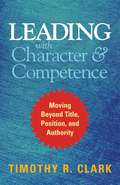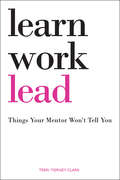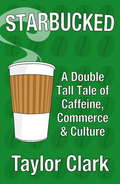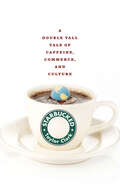- Table View
- List View
Syntex Laboratories (A)
by Darrel G. ClarkeA consulting project involving a mathematical model of the sales force indicates that Syntex Labs should nearly double the size of their sales force and drastically alter their allocation of sales effort to the product line and physician specialties. The questions are whether the results are reliable and what action should be taken.
Contextualizing Jamaica’s Relationship with the IMF
by Christine Clarke Carol NelsonThis ambitious book provides a comprehensive quantitative and qualitative assessment of Jamaica’s ties to the International Monetary Fund, focusing on Jamaica’s historical relationship with the IMF and reflecting on the domestic and international discourse surrounding the evolution of this relationship. Notably, this volume presents a critical analysis of Jamaica’s first engagement with and departure from the IMF and interrogates the political economy of the period. Jamaica’s economic experiences are assessed in the context of major global events, including the food price crises of 2007 and the global economic crises of 2008 and 2009. This book also looks at policy implications, and its well-researched analysis will be of great value to practitioners and policymakers as well as academics.
Jamaica’s Evolving Relationship with the IMF: There and Back Again
by Christine Clarke Carol NelsonThis book explores Jamaica’s contemporary relationship with the International Monetary Fund since 2010. It looks at Jamaica’s high debt and its inability to access financial support amidst international capital market restrictions, contextualizing harsh socio-economic realities. This book discusses Jamaica’s second return to the IMF and the resulting network of actors, governance and political and socio-economic efforts to re-engender a relationship with a “new’ IMF. Credibility was restored, demonstrated by and leading to the successful implementation of the 2013 Extended Fund Facility and subsequent exit to a Precautionary Stand-By Arrangement in 2016. Clarke and Nelson signal from their analyses lessons learned, discussing the economic prognosis for Jamaica as well as their relationship with the IMF under the shadow of the COVID pandemic.
Essential Student Cookbook: 400 Quick Easy and Cheap Recipes
by Cas ClarkeCas Clarke originally combined her two most successful books to create THE ESSENTIAL STUDENT COOKBOOK. This fully updated version of the bestselling compendium puts everything into one modern and redesigned volume for the aspiring student cook. Based on Cas's own experience, it gives basic guidance on essential equipment, what to take for the store cupboard and how to cope with the vagaries of cooking in hall. The recipes are completely straightforward and assume no prior knowledge. They take into account the student's limited means and time but also cater for the odd occasion when they might want to splash out or entertain friends.
Take a Lesson: Black Achievers on How They Made It and What They Learned Along the Way
by Caroline V. ClarkeA fascinating set of Black perspectives on what it takes to succeed today In Take a Lesson: Today's Black Achievers on How They Made It and What They Learned Along the Way, Updated and Revised, award-winning journalist and author Caroline Clarke once again compels a dynamic list of Black business heroes and role models to openly share their own goals, hits, and misses, exploring what they overcame and what they’re still working to overcome, not just for themselves, but for their peers and would be peers, who the equity odds are still against. In this book, you’ll find: Updated interviews with Black corporate titans containing critically important lessons about business success Deeply personal accounts of the journeys of Black superachievers from a diverse set of backgrounds and industries who are still rising in their industries Insights into the ways the world has changed—and the ways it hasn’t—since the release of the first edition in 2001 Perfect for Black students and early-career professionals looking for proven ways to navigate the unique challenges they’ll face, Take a Lesson is also a great resource for allies seeking to gain perspective on a critically important set of experiences. While these stories are specifically of Black success, their ability to inform, inspire, and reaffirm the value of ambition and perseverance, no matter the odds or era, transcends race.
Researching with Feeling: The Emotional Aspects of Social and Organizational Research
by Caroline Clarke Mike Broussine Linda WattsWhy should researchers be interested in their feelings and emotions as they carry out research? Emotion is what it is to exist, to be human, and is present in every sphere of our lives. All activities are infused with emotion, even those that are constructed as ‘rational’, because rationality and emotionality are interpenetrated and entwined because all thinking is tinged with feeling, and all feeling is tinged with thinking. This book illuminates the emotional processes of doing social and organizational research, and the implications of this for the outcomes of research. With contributions from leading academics and research practitioners, it addresses the significant issue of the sometimes intense emotional experiences involved in doing research and the implications it has for the theory and practice of social research. By examining the nature of feelings and emotions, it explores how we might understand researchers’ emotions and experiences, and considers the often powerful feelings encountered in a variety of research contexts. Topics discussed include: power relations; psycho-social explanations of researcher emotions; paradoxical relations with research participants and the sometimes disturbing data that is gained; research supervision; the politics of research; gender; publishing, undergoing vivas and presenting at conferences. This book will therefore be a valuable companion to researchers and research students from the start of their career onwards.
Double Down: Bet on Yourself and Succeed on Your Terms
by Antoinette M. Clarke Tricia Clarke-StoneTricia and Antoinette Clarke—best friends, Power Twins, and Boss Ladies—show you how to take your work and life to the Next Level. “Aspiring Boss Ladies in any field should pay attention.”—Gabrielle Union-Wade, actress, activist, and New York Times bestselling author of We’re Going to Need More Wine As African American women who have climbed their way to the highest ranks of the media world, Tricia and Antoinette have learned that to win when the deck is stacked against you, you need to ditch the old Status Quo rules. Whether you’re starting your career, wondering why you’re not further along, or looking to pivot, you’ve got to double down on yourself, and you’ve got to cultivate a tribe of people who will double down on you, too. Now, they share their wisdom with the next generation of Boss Ladies looking to up their game. If you’re tired of getting second-class rewards for first-class work and you’re ready to be respected for who you are, Double Down will give you the tools and tactics to go all in on your dreams. Among the lessons you’ll learn: • Don’t emulate, originate: Identify your unique superpowers to start from a place of strength. • Don’t stay in place, move into white space: To stand out, use your superpowers to do something no one else does. • Don’t just compete, play the long game: Work backward from where you want to end up—aim high, go far. • Don’t inherit your tribe, build it: Actively cultivate a crew of people who will push you to go after your most audacious goals (and set new ones). Packed with strategies and solutions, as well as stories of other badass Boss Ladies including Ayesha Curry, Carly Cushnie, Anne Wojcicki, and many others, this remixed rulebook will help you see the power in yourself—and double down on it.
Entrepreneurial Attributes: Accessing Your Inner Entrepreneur for Business and Beyond (ISSN)
by Andrew Paul ClarkeEverybody wants their employer to recognise and value the skills and attributes they have, but not everybody feels those skills are valued. Entrepreneurial Attributes: Accessing Your Inner Entrepreneur for Business and Beyond looks at the link between skills, actions and attributes, and the value they present: value in terms of how an employee can be more valuable to the company they work for – in essence, more employable. The book aims to answer the question: why are entrepreneurial attributes we see in businesspeople valued, but in non-businesspeople they are sometimes not recognised when there is a clear link between entrepreneurial skills and attributes, human capital (effectively your CV) and how successfully a company performs?Entrepreneurial Attributes: Accessing Your Inner Entrepreneur for Business and Beyond discusses how we currently view skills, actions and attributes, and how those attributes add value to a person in life and to a business that person works for. The author questions whether certain skills and actions are unrecognised or neglected in today’s world, and uses case studies and research methodologies to illustrate how value can be recognised and appreciated within the context of human capital and firm performance. Finally, the book offers tools and strategies which may assist the reader in gaining a better understanding of the way in which their entrepreneurial actions and attributes can enhance their value as a person and also make them more employable. This book also offers businesses tools to better recognise and reward the skills it needs.The ideal audience for this book are those of us who wish to better evidence the skills and value we can offer a company; Entrepreneurial Attributes: Accessing Your Inner Entrepreneur for Business and Beyond will find an appreciative audience wherever there is a keen interest in the recognition and value of employee skills and attributes.
Future Fit: How to stay relevant and competitive in the future of work
by Andrea ClarkeJobs are changing, technology is accelerating, and we must adapt with new skills. Award-winning author, Andrea Clarke, shares advice for upgrading our skills to suit a competitive workplace.The need for skills that defy disruption has never been so urgent, as traditional workplace models give way to confronting new rules of engagement. If you're looking for job security, growth and acceleration in a radical, new workforce, then Future Fit is the place to start.Award-winning author Andrea Clarke shares her experience, expertise and tactical advice on how to become truly Future Fit. “The future of work is here and it's about talent – your talent. It's about upgrading our human skills because they're landing differently in a hybrid environment,” says Clarke. “These skills are powerful differentiators in a dynamic and demanding new workplace.”Using her experience from a vibrant and varied career, Clarke explores the eight ‘real skills' we need for the 2020s: Reputation Capital, Adaptability, Communication, Networking, Creativity, Problem-solving, Leadership and Learning.A former Washington D.C. news reporter, Iraqi humanitarian aid worker and EdTech pioneer, Clarke founded FutureFitCo in 2012 – a business that trains emerging leaders to accelerate these core competencies. The Future Fit Digital Program, adapted from this book, is delivered globally to multi-national organisations.
Exploring Community Festivals and Events (Routledge Advances in Event Research Series)
by Alan Clarke Allan JepsonThe development of the festival and event industry has seen large scale growth and extensive government support as a result of objectives to enhance and project the image of place and leverage positive sponsorship and regeneration opportunities. As we move deeper into austerity measures prompted by economic recession, community festivals and events as a sacred or profane time of celebration can be considered even more important than ever before. This book for the first time explores the role and importance of ‘community’, ‘culture’ and its impact through festivals and events. Split into two distinct sections, the first introduces key themes and concepts, contextualises local traditions and culture, and investigates how festivals and events can act as a catalyst for tourism and create a sense of community. It then questions the social and political nature of festivals and community events through examining their ownership. The second section focuses on communities themselves, seeking to examine and discuss key emerging themes in community event studies such as; the role of diaspora, imagined communities, pride and identity, history, producing and consuming space and place, authenticity, and multi-ethnic communities. Examples are drawn from Portugal, the Dominican Republic, the USA, Malaysia, Malta, Finland and Australia making this book truly international. This significant volume will be valuable reading for students and academics across the fields of Event, Tourism and Hospitality studies as well as other social science disciplines.
International Hospitality Management: Concepts And Cases
by Alan Clarke Wei ChenInternational Hospitality Management: issues and applications brings together the latest developments in global hospitality operations with the contemporary management principles. It provides a truly international perspective on the hospitality and tourism industries and provides a fresh insight into hospitality and tourism management. The text develops a critical view of the management theory and the traditional theories, looking at how appropriate they are in hospitality and tourism and in a multicultural context. The awareness of cultural environments and the specifications imposed by those cultures will underpin the whole text.International Hospitality Management is designed to instil a greater awareness of the international factors influencing the strategies and performances of hospitality organisation. The approach focuses on a critical analysis of the relevance and application of general management theory and practice to the hospitality industry. Consisting of three 3 parts divided into 14 chapters, each of which deals with a major topic of international management, the book has been thoroughly developed with consistent learning features throughout, including:Specified learning outcomes for each chapterInternational case studies including major world events such as the September 11 Terrorist Attacks, the Argentine Financial Crisis, The SARS virus, The Institution of Euro, the accession of China to the World Trade Organization., and the expansion of European Union, as well as international corporations such as Marriott, Hilton, Intercontinental, McDonalds, Starbucks etc. It introduces the global market situation, including Americas, Europe, Asia Pacific, and Middle East. Study questions and discussion questions to consolidate learning and understanding.Links to relevant websites at the end of each chapterOn-line resources and a test bank is available for lecturers and students
Designing Computer-Based Learning Materials (Routledge Revivals)
by Alan ClarkeFirst published in 2001, this volume demonstrates how computer-based learning has the potential to provide a highly motivating learning experience, that it also has the potential to achieve exactly the opposite, and that the difference between these two extremes is the quality of the learning design. The challenge for the learning designer isn’t a simple one. You are being asked to prepare interactive learning for someone you can’t see and with whom the only interaction you are likely to have is via limited written communication. Fortunately help is at hand in Alan Clarke’s Designing Computer-Based Learning Materials. Dr. Clarke offers a definitive guide to each of the many elements involved in good design. This book explores the principles of adult learning, and relates to the potential, features and impact of computer-based learning. This is not a ‘how to…’ book, but rather one seeking to help you understand the different elements which go into computer-based learning. If you are commissioning material, it will help you to understand the contractors’ constraints. If you are designing materials yourself, it will allow you to avoid many of the errors it is all too easy to make when developing them. Computer-based learning materials are not all the same: their range reflects the variety of learners that use them and purposes they are used for; the different learning environments that are available to people; the different subjects that they wish to learn and the level to which they wish to take them. In the face of such a complex task, involving so many factors and variables, it is essential that the learning designer understands what is involved and uses a rigorous process for envisioning, planning, designing, implementing and testing their solution. This is a book about learning design and not about software production and, as such, it provides any aspiring designers with the fundamentals of producing the highly motivating learning experience, which should be their objective.
Storytelling for Grantseekers
by Clarke Cheryl A.Grantwriters often have little or no training in the practical task of grantseeking. Many feel intimidated by the act of writing, and some don't enjoy writing. In Storytelling for Grantseekers, Second Edition, Cheryl Clarke presents an organic approach to grantseeking, one that views the process through the lens of the pleasures and rewards of crafting a good story. Grantseekers who approach the process as one in which they are connecting with an audience (grantmakers) and writing a narrative (complete with settings, characters, antagonists and resolutions) find greater success with funders. The writing process becomes a rewarding way to tell the organization's tale, rather than a chore, and their passion and creativity lead to winning proposals. This book walks readers through all the main phases of the proposal, highlighting the creative elements that link components to each other and unify the entire proposal. The book contains resources on crafting an effective synopsis, overcoming grantwriter's block, packaging the story, and the best ways to approach the "short stories" (inquiry and cover letters) that support the larger proposal. Clarke also stresses the need to see proposal-writing as part of a larger grantseeking effort, one that emphasizes preparation, working with the entire development staff, and maintaining good relations with funders. In Storytelling for Grantseekers, new and experienced grantseekers alike will discover how to write and support successful proposals with humor and passion. New edition features: Overall updates as well as both refreshed and new examples Workshop exercises for using the storytelling approach New chapters on the application of the storytelling method to other fundraising communications like appeal letters and case statements, as well as the importance of site visits Example of a full narrative proposal
Trading Plans Made Simple: A Beginner's Guide To Planning For Trading Success
by ClarkeTrading Plans Made Simple is the essential guide for anyone who wants to achieve trading success and maximise their financial returns. Just as every business needs a robust plan for success, so too does your trading. In Trading Plans Made Simple you will discover the simplest and easiest way to build a comprehensive plan for your trading--one that will help you trade like a professional and provide you with a structure and strategy to guide your trading. Inside you'll find information on: conducting your trading like a business creating an individual trading plan tailored to your goals approaching your trading with discipline defining your trading strategy managing your money and assessing your risk measuring your success and reviewing your trading If you're ready to turbocharge your trading with an individual plan and maximise your success without all the stress, this is the book for you.
Capitalism, Not Globalism
by William Roberts ClarkCapitalism, Not Globalism shows that, while much has been made of recent changes in the international economy, the mechanisms by which politicians control the economy have not changed throughout the postwar period. Challenging both traditional and revisionist globalization theorists, William Roberts Clark argues that increased financial integration has led to neither a widening nor a narrowing of partisan differences in macroeconomic polices or outcomes. Rather, he shows that the absence of partisan differences in macroeconomic policy is a long-standing feature of democratic capitalist societies that can be traced to politicians' attempts to use the economy to help them survive in office. Changes in the structural landscape such as increased capital mobility and central bank independence do not necessarily diminish the ability of politicians to control the economy, but they do shape the strategies they use to do so. In a world of highly mobile capital, politicians manipulate monetary policy to create macroeconomic expansions prior to elections only if the exchange rate is flexible and the central bank is subservient. But they use fiscal policy to induce political business cycles when the exchange rate is fixed or the central bank is independent. William Roberts Clark is Assistant Professor, Department of Politics, New York University.
The SAGE Handbook of Housing Studies
by William Clark Professor David F Clapham Mr Kenneth GibbCross-disciplinary and critical in its approach, The SAGE Handbook of Housing Studies is an elucidating look at the key issues within the field. It covers the study of housing retrospectively, but also analyses the future directions of research and theory, demonstrating how it can contribute to wider debates in the social sciences. A comprehensive introductory chapter is followed by four parts offering complete coverage of the area: Markets: examines the perception of housing markets, how they function in different contexts, and the importance of housing behaviour and neighbourhoods Approaches: looks at how other disciplines - economics, geography, and sociology - have informed the direction of housing studies Context: traces the interactions between housing studies and other aspects of society, providing context to debate housing through issues of space, social, welfare and the environment. Policy: is a multi-disciplinary and comprehensive take on the major policy issues and the causes and possible solutions of housing problems such as regeneration and homelessness. Edited by leading names in the field and including international contributions, the book is a stimulating, wide-ranging read that will be an invaluable resource for academics and researchers in geography, urban studies, sociology, social policy, economics and politics.
Growing Up in Burbank: Boomer Memories from The Akron to Zodys
by Wesley H. Clark Michael B. McdanielLife in Burbank during the '60s and '70s was an unparalleled experience. From biking Lucky Busters trail to enjoying movies at the Cornell Theater and shopping at The Akron, Burbankers' choices of entertainment seemed endless. Relive fond memories of dining out at Genio's, the Dip or Santoro's. Recall visits to the Golden Mall before heading home to watch Dark Shadows on television. While some of the local icons may have changed, the spirit has remained the same--and it's waiting to be rediscovered. Authors Wes Clark and Mike McDaniel guide you through their hometown and remember the fads, the hijinks and the places that made Burbank the place it is today.
Socialist Development and Public Investment in Tanzania, 1964-73
by W. Edmund ClarkWith its emphasis on rural development as opposed to urban development, Tanzania has pursued an individual path in socialist development. This work is the first empirical analysis of public investment in matters of agriculture, education, rural health, manufacturing, and commerce, comparing the actual program of investment to the strategy outlined in the Arusha Declaration of 1967. In Socialist Development and Public Investment in Tanzania 1964-1976, Dr Clark finds that Tanzania has been more successful in reorienting its program of social investment than its program of economic development. This failure stems from real differences within Tanzania, and among socialists generally, about appropriate investment strategies for a country at Tanzania's stage of development. In fact, no clear specification of an economic strategy exists and, as a result, policy has been heavily determined by the interests of the dominant political groups. It also reflects the fact that, in its initial stages, Tanzanian socialism was not a mass movement. It was imposed from the top and consequently, the bureaucracy remains relatively immune from the pressures of the people and the poverty in which they live. Dr Clark argues that Nyerere's basic strategy is appropriate to Tanzania at a stage when it lacks the resources to pursue the traditional socialist goal of an integrated industrial economy, but that the implementation of this strategy should and must be improved. Skillfully blending political and social with economic analysis, he provides a provocative interpretation of socialist investment strategy in Tanzania and provides an illuminating perspective on the economics of developing countries.
Start and Run a Gift Shop: What you need to do to turn your idea into reality
by Val ClarkSetting up a shop, retail unit or market stall is one of the most accessible small business start-up options - it needs no specific training, no compulsory qualifications and no large capital outlay. Give your business a head start by following the advice in this book to make sure your business is built on solid foundations. It will tell you: how to research your business idea to ensure it will be a success; what you need to do to turn your idea into reality; and, how to manage yourself, your stock and your money to power ahead through good times and bad. No other book divulges this sort of insider knowledge of the retail trade. Author Val Clarke has over ten years' experience of starting up shops, running and selling them as well as importing and wholesaling. She has traded in a wide variety of goods, from clothing to furniture. Her latest venture, a mainstream gift and jewellery shop, opened in September 2007. This business is thriving, proving that her methods are successful and that times of economic downturn are also times of opportunity for the shrewd shopkeeper. 'When I opened my first shop I wished there was a book to help me. I learnt by trial and error, from my own mistakes and those of others. With this book you'll speed up the learning process and start to make a profit from day one'!
The 4 Stages of Psychological Safety: Defining the Path to Inclusion and Innovation
by Timothy R. ClarkThis book is the first practical, hands-on guide that shows how leaders can build psychological safety in their organizations, creating an environment where employees feel included, fully engaged, and encouraged to contribute their best efforts and ideas.Perhaps the leader's most challenging task is to increase intellectual friction while decreasing social friction. When this doesn't happen and it becomes emotionally expensive to say what you truly think and feel, that lack of psychological safety triggers the self-censoring instinct, shuts down learning, and blocks collaboration and creativity. Timothy R. Clark, a former CEO, Oxford-trained social scientist, and organizational consultant, provides a research-based framework to help leaders transform their organizations into sanctuaries of inclusion and incubators of innovation.When leaders cultivate psychological safety, teams and organizations progress through four successive stages. First, people feel included and accepted; then they feel safe to learn, contribute, and finally, challenge the status quo. Clark draws deeply on psychology, philosophy, social science, literature, and his own experiences to show how leaders can, and must, set the tone and model the ideal behaviors—as he says, "you either show the way or get in the way." This thoughtful and pragmatic guide demonstrates that if you banish fear, install true performance-based accountability, and create a nurturing environment that allows people to be vulnerable as they learn and grow, they will perform beyond your expectations.
EPIC Change
by Timothy R. Clark"More than ever, leaders are expected to be the change agents of their organizations. Yet CEO turnover continues to rise and organizations continue to struggle in their efforts to confront the fearsome adaptive challenges of the global age. Epic Change is a path-breaking contribution to the study of leadership and organizational change. Based on a landmark study of 53 cases of large-scale organizational change in business, healthcare, government, education, and the non-profit sector, acclaimed thought leader and researcher, Dr. Timothy R. Clark unveils the "Power Curve of Change" framework and EPIC system for change management (Evaluate, Prepare, Implement, Consolidate) for leaders who are charged to lead high-stakes change initiatives in their organizations. Epic Change presents a strategic-level road map, along with tactical level tools, for the every-day needs of leaders who must respond to all types of adaptive challenge to remain competitive. It represents a comprehensive, research-based program for leaders who want to develop the indispensable competency of leading change in a permanently and profoundly different age.Change rarely fails for lack of strategy--Clark shows that only the discretionary efforts of people can make change happen--and this requires leadership and energy management. The Epic Change approach has been successfully field-tested with leaders at all levels and in organizations around the world. This important resource provides leaders new research-based tools to increase and sustain the energy of any change effort."
Leading with Character and Competence: Moving Beyond Title, Position, and Authority
by Timothy R. ClarkLeading with Character and CompetenceMoving beyond Title, Position, and Authority "Leadership is an applied discipline, not a foamy concept to muse about," says three-time CEO, Oxford-trained scholar, and consultant Timothy R. Clark. "In fact, it's the most important applied discipline in the world." The success of any organization can be traced directly to leadership. And leadership can be learned. But too many books and development programs focus exclusively on skills. In reality, performance and ultimate credibility are based on a combination of character and competence. As Clark puts it, character is the core and competence the crust. He shows how greatness emerges from a powerful combination of the two, although in the end character is more important. A leader with character but no competence will be ineffective, while a leader with competence but no character is dangerous.Clark spotlights the four most important components of character and competence and offers a series of eloquent, inspiring, and actionable reflections on what's needed to build each one. Fundamentally, he sees leadership as influence--leaders influence people "to climb, stretch, and become." You need character to influence positively and competence to influence effectively. This is a book for anyone, no matter where he or she is on the organization chart. Because today employees at all levels are being asked to step up, not only can everyone be a leader, everyone has to be. Clark's insights are profound, and his passion is infectious. "Leadership" he writes, "is the most engaging, inspiring, and deeply satisfying activity known to humankind. Through leadership we have the opportunity to progress, overcome adversity, change lives, and bless the race."
Learn, Work, Lead: Things Your Mentor Won't Tell You
by Terri Tierney ClarkIn today's world, women's career success relies on much more than just taking advice from a mentor, knowing how to network, and being proactive. Young professional women have to learn how to analyze career decisions for themselves and figure out what to do when their decisions don't work out. Learn, Work, Lead: Things Your Mentor Won't Tell You is a cutting-edge career and job search guide that will teach you those skills and give you the tools to navigate successfully in a gender-biased workplace. It will show you how to plan your career now so that you will be chosen to lead in the future. Coaching on how to analyze career decisions and make the best choices even when your solutions differ from your mentors' advice. Guidance on how to succeed even when you're faced with problems that no one could predict. Tools to develop your optimal career plan. Lessons from top business leaders' career war stories.
Starbucked
by Taylor ClarkSTARBUCKED is the first book to explore the incredible rise of the Starbucks Corporation and the caffeine-crazy culture that fuelled its success. Part Fast Food Nation, part social history, STARBUCKED combines investigative heft with witty cultural observation. How did Starbucks become an international juggernaut? What made the company so beloved that more than 40 million customers visit every week, yet so loathed that protestors have firebombed its stores? Why did Americans suddenly become willing to pay $4.50 for a cup of coffee? And why did the world follow? Taylor Clark provides an objective, meticulously reported look at how Starbucks manipulates psyches and social habits to snare loyal customers, and why many of the things we think we know about the coffee chain are false.
Starbucked: A Double Tall Tale of Caffeine, Commerce, and Culture
by Taylor ClarkSTARBUCKED will be the first book to explore the incredible rise of the Starbucks Corporation and the caffeine-crazy culture that fueled its success. Part Fast Food Nation, part Bobos in Paradise, STARBUCKED combines investigative heft with witty cultural observation in telling the story of how the coffeehouse movement changed our everyday lives, from our evolving neighborhoods and workplaces to the ways we shop, socialize, and self-medicate. In STARBUCKED, Taylor Clark provides an objective, meticulously reported look at the volatile issues like gentrification and fair trade that distress activists and coffee zealots alike. Through a cast of characters that includes coffee-wild hippies, business sharks, slackers, Hollywood trendsetters and more, STARBUCKED explores how America transformed into a nation of coffee gourmets in only a few years, how Starbucks manipulates psyches and social habits to snare loyal customers, and why many of the things we think we know about the coffee commodity chain are false.

